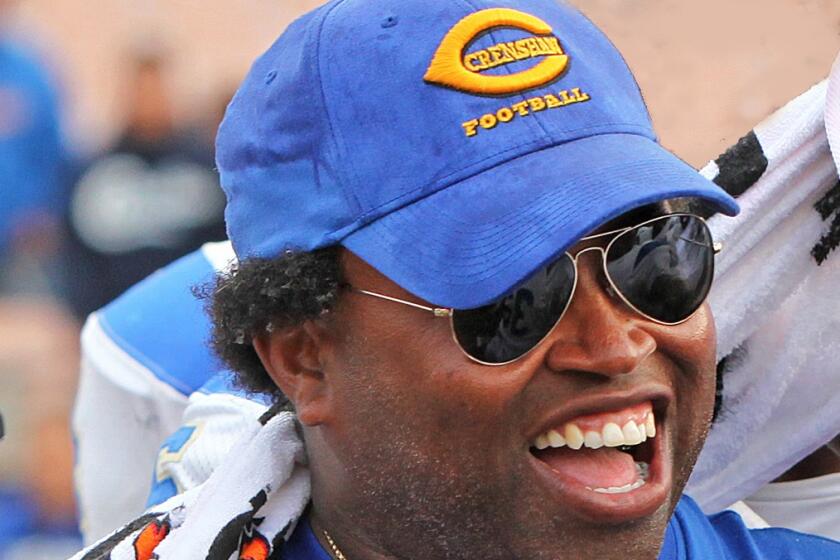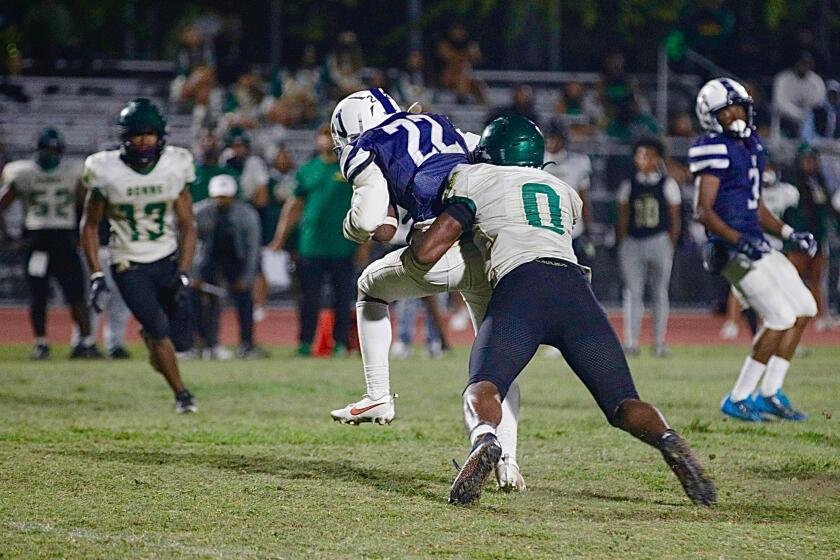In Texas, drought is a personal foul
ROBERT LEE, TEXAS â It is the day before homecoming, and there is trouble at the Robert Lee High School football field.
The field is dying.
The field that was once so lush, so emerald green, that the maintenance staff took calls from other schools begging to know its secret. Visitors sometimes assumed it was AstroTurf, then genuflected and found, to their surprise, real blades of springy Bermuda grass. Then came Texasâ punishing drought. The parched field now has patches of yellow and brown while the rest struggles to stay green.
Robert Lee is not alone. All across Texas, in heat-battered towns where water towers hang like giant IVs, high schools are struggling with fields where grass has shriveled, dirt has hardened and artificial turf has become too hot to handle.
In a town this small -- population 1,050 -- everyone holds a memory of the field. It was where wide receiver Lupe Torres learned the meaning of dedication. Where quarterback Aaron Hood made his father, then superintendent, proud. And where defensive end Jimmy Skinner played on the team that won the Region I championship in 1984.
So people here are doing everything they can think of to save it. After all, this isnât just about a game. Here in West Texas, football is God, and the field is church.
--
At the start of a recent school day, Coach Shay Avants, 35, strides past the orange and black âRobert Lee Steersâ sign to survey the field. He glances up. Gray clouds have been roiling since dawn. All across town, named after the Confederate general, people are talking rain. Since the start of summer, they have received less than an inch.
Avants stops under a goal post and kicks the field. Dust rises. Thatâs not uncommon in the red clay fields of Coke County, about 250 miles west of Dallas. Around here they quote an old saying about football -- âthree yards and a cloud of dustâ -- with the emphasis on dust. But itâs not supposed to be this bad.
They have been watering twice a day. The record-breaking heat wave evaporated everything, even overnight. Nearby San Angelo recorded 97 days of triple-digit temperatures.
âWe seeded,â Avants says, âbut the seed never came out.â
The storm has cooled the temperature into the mid-70s, but it will rise to 100 by dayâs end. The coach looks up again and scowls. âWeâre not going to have a miracle overnight,â he says. âIâm sure the opposing team ... I canât imagine what theyâll think.â
The opposing team is the Blackwell Hornets. The Steers once felt sorry for them because they trained on such a paltry little field. Last year, the Hornets got artificial turf, and with it, a sense of superiority.
But even schools with artificial turf, including Robert Leeâs longtime rival, the Bronte Longhorns, have suffered. At Wylie High School near Dallas, where the temperature on its field reached 185 degrees this summer -- coaches snapped photos of thermometers to prove it -- crews started watering the fake turf to cool it down, and practices were held on a grass field instead.
In Robert Lee, problems with water go back years before the current drought. The level of a nearby lake dropped during the last decade, and with it the town and school population, with 100 fewer students. Seven years ago, the school rolls fell to about 275 students, down from five to two busloads, and the Steers were forced to go from 11-man to six-man football.
Avants crosses the field to where Lupe Torres is kneeling in the balding grass. Torres, 46, runs school maintenance, but specializes in keeping up the field.
He has tried aeration, heâs tried fertilizer. Today he was supposed to paint an intricate diamond or checkerboard pattern in the end zone, âpro-style,â to surprise the Steers. But the paint wonât stick to dirt.
Heâs not even sure whether thereâs enough grass to emblazon the image of the school mascot at center field, a homecoming tradition.
Torres is embarrassed, depressed even. He feels for the seniors. They were supposed to write their names in paint on the grass. Now thatâs canceled. Robert Lee runs grades K through 12, so he has known these kids most of their lives.
Hood, the former quarterback who returned to Robert Lee a decade after he graduated to succeed his father as superintendent and athletic director, joins Torres and the coach at center field. All three sport Steers shirts, their hair cropped short. They look like a team huddling up.
Hood, 33, walks Torres over to a circle of green at midfield. On the edge of the sprinklerâs range, the turf is starting to brown.
âWe got to try to hit these stations again,â he says, kicking the dirt. âLook at this -- itâs nothing but powder.â
Hood has a school budget of $3.5 million. When the town, like many across Texas, came under watering restriction in April, he started paying about $200 three times a week to truck in water. Each 6,300-gallon load is piped in through the sprinklers.
In May, they started watering the field daily. Then nearby wildfires tied up the water haulers, so he turned to Jimmy Skinner, another Robert Lee graduate. Hood knew that Skinner, 45, a truck driver for the oil companies, had inherited a gift for dowsing, or âwitchingâ water, from his father. Come help us, Hood said.
Torres knew Skinner too. They had played football together in the â80s. Skinnerâs 16-year-old son, Zach, a junior, plays center for the Steers, a living image of his fatherâs senior picture that still hangs on the high school wall -- same dark eyes, shaggy hair, strong jaw and broad shoulders.
Dowsing rods in hand, Skinner crisscrossed the field in June. He settled on a spot, but was suddenly unsure of his own powers. West Texas is mean country, full of things that stick, stink or sting. Even if he found water, the well might be salty, or run dry.
Hood paid about $18 a foot to drill hundreds of feet and even bought a used 500-barrel water tank from Bronte for $1,000 to store whatever they found.
The school drilled three times near the field. The third time, 240 feet down, they struck water. And it was good water -- not too salty, with a strong flow. Torres installed hundreds of feet of pipe to connect the new well to the field.
âNever hit a dry hole yet,â Skinner says.
Skinner does not regret the taxpayer money spent to revive the field. To those who question it, he says, âCome live here.â
Torres looks up from the field, encouraged. The troubled sky has begun to spit rain.
--
On homecoming morning, a block away at Cindyâs Grocery, former Steers coach Kenneth Rasco -- who taught both Skinner and Torres -- is fetching his coffee. He unfolds the San Angelo Standard-Times and reads about all the other dying fields during the seemingly endless drought.
Coaches in nearby Llano and Junction were downplaying rumors that they might have to play their home games on the road because their bone-dry fields had become unplayable. Odessa Highâs coach complained that players were suffering additional injuries as their field became as hard and dry as concrete. From Lubbock to Dallas and San Antonio, coaches were debating whether to re-sod, truck in water or wait for rain.
The overnight drizzle was not nearly enough to save the Robert Lee field. But the consensus around town is that the field perked up. It finally holds the orange paint Torres sprays with an air gun. He traces the outline of a steerâs head, pointing out patches of dirt on the cheeks that make him nervous.
That night the questioning from the sidelines commences soon after kickoff.
âYou see that dust coming up?â
âDidnât yâall water it?â
Men in straw cowboy hats line the fence in front of the concession stand thatâs selling barbecue and Frito pies. Skinner stands near the back.
âWe watered it all last night,â Hood says, keeping his cool.
âHave you been hauling water?â
âEvery day,â Hood says.
âWhat about the well?â
âWe can only do about five gallons a minute,â Hood says, and the men all nod.
No one in the crowd or the packed stands or the line of pickups backed up to the fieldâs cyclone fence asks how much all that water cost.
The Steers donât seem to mind the field. By halftime, they are up 46-8. They go on to win, 54-8.
In the press box, under the unforgiving glare, Torres critiques his work. As the crowd files out, he lingers. Below him in the stands, a voice drifts up.
âHave you been watering the field?â
He listens for Hoodâs reply.
âYeah, weâve been watering the heck out of it.â
Torres does not allow himself time to grieve. He has to prepare for the next home game against the Santa Anna Mountaineers in two weeks.
Throughout town that night, behind dark windows, television screens glow with football highlights from across West Texas. Suddenly, someone shouts, âThereâs our boys!â
Sweet teas, leftover barbecue and worries about the thirsty field are set aside as people settle down to watch.
And when the scroll at the bottom of the screen says Bronte lost, living rooms erupt in cheers.
--
molly.hennessy-[email protected]
More to Read
Go beyond the scoreboard
Get the latest on L.A.'s teams in the daily Sports Report newsletter.
You may occasionally receive promotional content from the Los Angeles Times.











